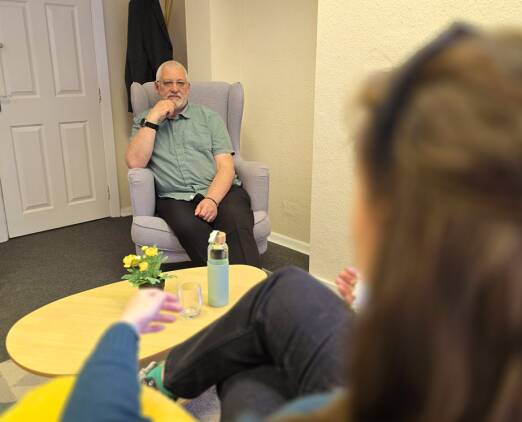Counselling tailored to you as an individual
I have an integrative person-centred approach to my counselling sessions, because one size doesn't fit all. This means I take into account you as an individual, your circumstances, and I take time to understand who you are. By using elements of many different approaches, I can help you explore and alleviate any issues you have. Below are some, but not all, of the approaches I use; we can discuss these in more detail at the introductory meeting.
Mindfulness
Mindfulness is a type of meditation which brings us to being intensely aware of what we are sensing and feeling in the moment, without interpretation or judgment. Practicing mindfulness involves breathing methods, guided imagery, and other practices to relax the body and mind. It can help reduce anxiety and depression. There's evidence that mindfulness can lower blood pressure, improve sleep and it may even help people cope with pain. By practicing mindfulness, we can come to a peaceful acceptance of where we are, see what needs we have, and ways to achieve our goals.
Compassion Focused Therapy (CFT)
CFT can help us to learn to feel more safeness and warmth in our interactions with others and ourselves. By focusing on how we can be compassionate with ourselves, with others and with our environment, we can learn to respond to the stresses and anxiety of everyday life with consideration, and empathy.
Behavioural Therapy
Unlike Psychotherapy, Behavioural Therapy is based on the idea that all behaviours are learned and that these behaviours can be changed. Just like our smart phones we need to take time to update our system to help change potentially self-destructive or unhealthy behaviours. To examine our reactions to our emotions, get rid of unhelpful responses and strengthen our resolve to do what is right for us.
Person-Centred Therapy
Person-centred counselling is rooted in the belief that, given the right conditions, everybody can reach their full potential and become their true self. This process is innate and accessible to everyone. By accepting you as you are, by being honest and transparent in how I experience you and your world and by seeing your world from your viewpoint, I can help guide you to discover your own abilities and autonomy, so that you become more able to achieve your ambitions and manage your current and future difficulties.
Cognitive Behavioural Therapy (CBT)
CBT helps us learn how to identify and change the destructive or disturbing thought patterns that have a negative influence on our behaviour and emotions. It focuses on changing the automatic negative thoughts that can contribute to and worsen our emotional difficulties, particularly depression, and anxiety. Replacing these spontaneous negative thoughts, which have a detrimental influence on our mood, with more objective, realistic thoughts. Enabling us to implement genuine solutions to your problems.
Comprehensive Resource Model (CRM)
The Comprehensive Resource Model aims to realign and re-integrate dysfunctional bodily and emotional sensations arising from a person’s traumatic experiences. In a CRM session, there’s no need to talk about what happened. Rather than delving into the stories about the past, you are encouraged to focus on the physical sensations arising in your body as you silently and safely recall your worst memories. By facing these emotions fully, if only for a moment, you can let go of the buried feelings of anger, terror, or shame. Using this individualised approach, you can overcome and transform the negative effects of the challenges you have encountered, learning to not just to survive but to thrive.
How I deliver therapy sessions
Face to Face
Telephone
Internet
Long Term
Short Term
Time-Limited
Some of the issues I can help with
Abuse
Addictions
Anger management
Anxiety
Bereavement
Chronic fatigue syndrome / M.E / Long Covid
Cultural issues
Depression
Disability
Eating disorders
Health related issues
Identity issues
Loss
Men's issues
Obsessions
Phobias
Post-traumatic stress
Personal development
Redundancy
Relationships
Self-esteem
Self-harm
Service veterans
Sexual identity
Sexuality
Sleep disorders
Spirituality
Stress
Substance dependency
Trauma
Work related issues
Women’s issues





